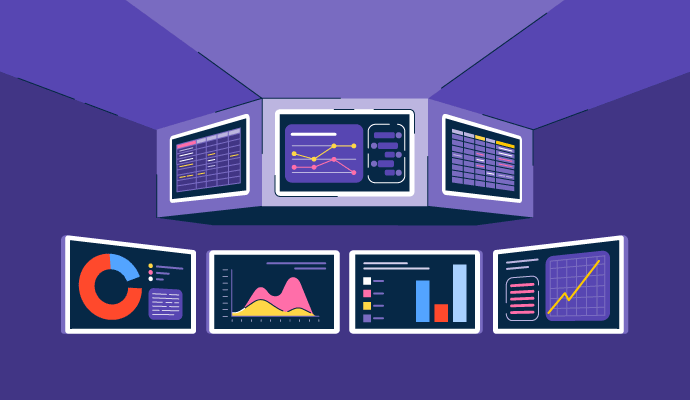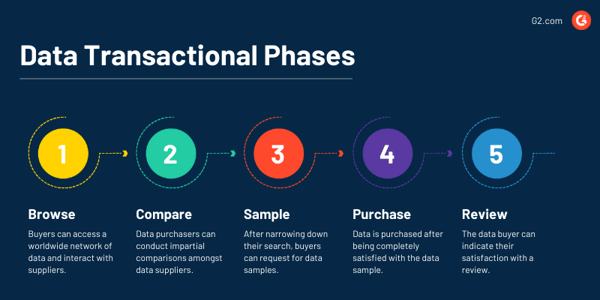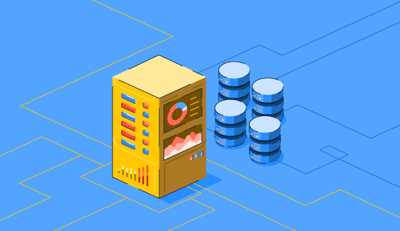September 4, 2023
 by Samudyata Bhat / September 4, 2023
by Samudyata Bhat / September 4, 2023

Making money from data isn't just limited to Silicon Valley behemoths. The growth of modern data marketplaces today has made it possible for anybody to profit from their data.
Businesses quickly discover that they have more information than they realize when they begin storing, evaluating, and acting on data insights strategically. And by selling it, they've constructed some of the world's largest business empires and most recognizable brands.
Data exchange platforms today have made data shopping easier than ever. They simplify data sourcing for data purchasers and maximize data monetization for data suppliers.
But should you go to a data marketplace with your reusable bag? Do they have byte-based fish and apples for sale? Perhaps a lot of us are equally confused, so let's get into it.
A data marketplace is a platform where users can purchase and trade data. Here, suppliers efficiently promote, manage, and sell their data, and data purchasers can explore, compare, and purchase data from numerous sources gathered in a single, easy-to-navigate place.
A data marketplace functions similarly to any other online market that promotes goods trade. Alibaba, for example, is a wholesale products platform, but Airbnb is a marketplace for short-term real estate, mostly holiday rentals. What's crucial to note is that neither Alibaba nor Airbnb owns any capital exchanged on their markets. Alibaba doesn’t sell food or retail items, while Airbnb runs without owning a single house.
Both of these are examples of two-sided marketplaces, platforms where commodities are exchanged. The markets don’t own the commodities exchanged. Instead, they serve as a bridge between the two sides: buyers and sellers, consumers and vendors, demand and supply – you get the idea!
Data marketplaces are bifurcated markets with two types of data providers: those wanting to monetize their data assets and those looking for a data source that matches their needs. Data markets benefit both sides, which is why more businesses are turning to them to develop effective data strategies.
You must consider several variables when tracing the meteoric ascent of the data marketplace. In a nutshell, the variables are ideal solutions to the issues that arise when trying to access, manage, and profit from external data.
The internet of things (IoT), big data, artificial intelligence (AI), and machine learning (ML) technologies have all converged, resulting in a massive surge in market data and third-party data. Data markets provide three key advantages in light of this tremendous increase in data production.
For starters, through data markets, we can make our private data commercially accessible for purchase online in real-time.
Secondly, data markets let ordinary individuals navigate the intimidating data landscape. In addition to specialists like data scientists and analysts, anyone can learn to use a data marketplace.
Finally, data marketplaces owners bring benefits to the business of both buyers and sellers by creating a two-sided market that meets the needs of each party. Since data markets don't need to invest in building their infrastructure to expand, they can do it on a much larger scale.
Data capital, shorthand for external data, is a resource with the potential to alter the course and success of innumerable enterprises and organizations, much as human and financial capital. There is increased activity in the market for external data capital today. But why? Because optimizing predictive models, increasing efficiency, data security, and maximizing return on investment (ROI) are all made more accessible when companies enhance their proprietary information with external insights.
Data monetization is quickly becoming a reliable and scalable revenue stream for forward-thinking firms and corporations, which is how DaaS, or data-as-a-service, emerged. In the future, any business can convert to a DaaS business by selling off its assets.
Assume for a moment that you own a virtual travel business. Your company primarily offers customers vacation-related services like transportation, lodging, and entertainment. Starting a DaaS business may bring significant additional income to your organization because the mountains of information produced by your everyday business operations and internal systems have value. An online travel agency automatically gathers data in high-demand areas, including traveler opinions, occupancy rates, traffic patterns, airline schedules, and website visits.
When there is high client demand for this knowledge, why let it sit dormant in internal databases? Thanks to data markets, monetizing data is simple nowadays. With the help of a data marketplace, businesses can make their proprietary data available to third parties safely and transparently.
Here, we reach the last and most crucial factor for the success of data markets. They provide quick and easy data collection without sacrificing data privacy. All participants in a verified data marketplace, including sellers and purchasers of data, must adhere to the marketplace's security standards. This implies that users who wish to participate in a data marketplace must adhere to all applicable laws and ethical standards concerning collecting personal information.
For instance, data suppliers must demonstrate that they comply with General Data Protection Regulation (GDPR) and California Consumer Privacy Act (CCPA) requirements when they collect data and that they anonymize personally identifying information before aggregating it. A data marketplace only lets suppliers start selling data if verified and approved.
Certain data exchanges include blockchain technology in their operations for added security. Known as decentralized data markets, they’re the new wave of online data exchanges.
Like any other online market or e-commerce platform, data marketplaces depend on supply and demand. But instead of buying a coat or a streaming service membership, customers purchase information. They facilitate data commerce, which works similarly to other forms of trade, including e-commerce, brick-and-mortar retail, and business-to-business (B2B) exchanges. The data marketplace uses the following features to facilitate transactions and procurement of relevant data.
Four general categories are applied to data markets based on the target audience and the origin of the data. Let’s discuss the various categories of data markets.
Personal data marketplaces are a relatively new development. Like decentralized data marketplaces, they were formed because customers didn’t want tech businesses exploiting their personal and sensitive data for commercial gain. Personal data marketplaces empower customers to be compensated for consent-managed data sharing.
This means the user consents to the personal data marketplace sharing information about their online behavior and location. Individuals are compensated for every piece of shared information; data is acquired and managed with consent.
Personal data markets are another novel approach to improving the external data sector. First, they ensure that individuals receive a fair portion of the behavioral knowledge firms collect about them.
Second, they’re an impetus behind Data for Good. Personal data marketplaces contain critical insights into human mobility and behavior for particular use cases, such as location mapping in catastrophes and pandemics. These insights assist governments and humanitarian groups in successfully responding to issues, while individuals who choose to give their data are paid for it. For security reasons, they’re frequently paid through vouchers or gift cards.
Datum, SynapseAI, and Datawallet are examples of personal data marketplaces.
B2B marketplaces are used to trade data between corporations and organizations. Individuals register for the platform on behalf of the firm they own or work for. This is because corporations, not people, are often interested in purchasing data. Firms often want to monetize their data at scale because they have enough to make it profitable.
This is where B2B data markets come into play. They help businesses reach their commercial and operational goals by simplifying acquiring and selling data. These data markets serve as a demand-creation platform for commercial data suppliers and software-as-a-service (SaaS) vendors. They operate on various business models: some require suppliers to subscribe and pay to display their data, while others provide an accessible avenue for data monetization in which the vendor only pays when their data is successfully sold.
Businesses obtain data from B2B data markets rather than open-source alternatives since B2B markets typically provide analytics-grade data. These sophisticated datasets and APIs provide firms with information that their competitors are unlikely to have because they are exclusively accessible for purchase.
Datarade, Snowflake, AWS Data Exchange, and Eagle Alpha are B2B data markets examples.
Several businesses have created internal data markets and catalogs in response to the demand for improved analytics, which are only available to employees and consumers. Users browse the marketplace and choose the appropriate data for their project; the information and associated metadata are immediately available.
Alation Marketplace and SAP Datasphere are two companies with internal data markets. Data suppliers can list their data in these internal data markets to engage with Alation and SAP in-market buyers.
The most straightforward approach is to join a data commerce cloud (DCC), which allows you to participate on both fronts with a single account. Although internal data markets have yet to be widely known, they have a high conversion rate since everyone who uses them has a specific use case in mind. They’re usually quite far down the sales funnel, ready to use external data for analytics.
IoT data markets are being developed to integrate global information streams. When harnessed and processed, they can align you with consumer behavior, internet trends, and technology advancements. Since the open network supports this type of data marketplace, IoT markets are often relatively accessible, with variable pricing choices such as pay-per-hour.
Many organizations find that monetizing data through an IoT data marketplace is an appealing alternative. As businesses expand the quantity and quality of hardware in their technological stack, they create more data as a byproduct. These by-products, the “'digital twins” mentioned previously, are a significant data asset. Companies can tap into a simple cash stream by listing IoT-sourced data and taking advantage of the products they currently use.
IOTA Data Market and Streamr are two examples of IoT data markets.
Browsing, comparing, sampling, purchasing, and reviewing are the five fundamental transactional phases that collectively comprise a data marketplace.

Data markets host numerous data suppliers and providers on a single platform. Vendors from around the world utilize data markets, and buyers can easily access this worldwide network of data sources and interact with suppliers they wouldn’t have otherwise found.
Data marketplace customers can tailor their search based on specific data characteristics to improve the browsing experience. They look to data markets to search for their specific data while keeping budget and geography in mind, just like they do when they enter a price range for products on Amazon or filter results based on location with Airbnb. This allows purchasers to find datasets with the proper country coverage at the right price.
Data markets give purchasers the means to compare providers quickly. Although the degree of detail varies between platforms, all data markets summarize a provider's data offering. Some markets require consumers to contact individual providers to learn more about their data solutions, while others make it easy for purchasers to understand a provider's data capabilities.
Unlike other techniques of data sourcing, data marketplaces concentrate a particular emphasis on this step of the buyer experience. This is because data marketplaces are self-service systems for improved decision-making. Making it simple for data purchasers to conduct impartial comparisons amongst data suppliers increases the buyer's likelihood of discovering the data they want.
Following the comparison, the logical next step is to try before you purchase. When buyers narrow their search to one or two data provider choices, they almost always request a data sample.
Buyers must ensure that the external data that grabs their interest works for their use case before committing to a purchase. Therefore, it must have the exact insights that will allow people to make data-driven decisions. External data must also be integrated with the organization's internal systems and software. Analysts and data scientists can use a data sample to execute tests to check that the dataset, data service, or API is suitable.
When a data buyer is satisfied that the data sample is compatible with their organization's software systems and will function for their use case, they can buy the data. Commercial data is available in various formats, depending on the vendor.
The data buyer can indicate their satisfaction at the final step. Buyer reviews affect every transaction, whether for a hotel room or a pair of shoes. Data marketplaces play an essential role in the external data sector by inviting purchasers to assess the data products they purchase.
Reviews result in significant transparency in the ecosystem. This drives suppliers to give the finest data solutions and services to get positive feedback and stand out from competitors.
Data warehouses and data lakes are on-premise data management and analysis systems. They’re beneficial for processing data within companies. The variety of data available in data marketplaces is greater lakes. Depending on the marketplace, you might be able to purchase any form of data, such as consumer behavior, financial, geolocation, and technological stack data.
Data marketplaces supply data that’s ready for use in a wide range of industries. Internal data sources, such as data warehouses, may contain data that is difficult to comprehend since it’s only supposed to be for internal use. Marketplaces categorize data and define its features so that data scientists can focus on collecting insights rather than extracting, transforming, and loading (ETL) operations.
-1.png?width=600&height=333&name=Data%20marketplaces%20vs.%20data%20lakes%20vs.%20data%20warehouses%20(1)-1.png)
A data marketplace presents numerous significant benefits and applications for businesses.
The companies below utilize data to guide business choices, enhance goods and services, and stay ahead of the competition.
Used in the data fulfillment industry, a data marketplace is a term denoting an online platform (often cloud-based) that allows consumers to purchase and sell data. Data on these platforms is bundled into goods, which may be purchased similarly to a product from Amazon or another e-commerce website.
On the other hand, data exchanges are an alternative for firms that, rather than selling their data, see value in exchanging it with another company (typically in the same industry, but not necessarily). Instead of paying for data, companies earn mutual benefits by exchanging it.
Due to similar technological advances, the phrases data marketplace and data exchange have become relatively identical. In some circumstances, both buying and selling data, as well as data exchange, are possible. Different front-facing environments can be prioritized depending on the user.
So, a public user may see a data product for sale, while a private user member of an established data exchange network may see the same product available for free download. Data fulfillment (purchased, sold, or shared) is managed on a single centralized platform.
Companies turn to data exchange platforms to send, acquire, or enrich data without altering its underlying meaning throughout acquisition. Data is transferred so that it can be ingested by receiving systems, often by completely normalizing it. As a fundamental component of these exchanges, data as a service capabilities are frequently used, where industry, market, source, or subject matter data may be collected in bulk to feed data-driven insights and business intelligence.
of small businesses in the IT industry use data exchange solutions
Source: G2 review data
Some of the benefits that data exchange software buyers want include:
* Above are the five leading data exchange solutions from G2’s Summer 2023 Grid® Report.
Companies specializing in data markets have proliferated since the early days of the internet by bridging the gap between data suppliers and users. It’s only natural that data marketplaces develop new types of modern data platforms to continue the provision and consumption of data in response to the needs of data providers and consumers.
However, it's hardly shocking that flaws have surfaced in data marketplaces. While it's true that overcoming these obstacles can be challenging, it’s also vital to meet them with creative solutions as businesses find it less of a chore to digest and put to use, and big data thrives.
Intrigued by data? Learn more about data exchange and why they are essential for businesses today!
Samudyata Bhat is a former Content Marketing Specialist at G2. With a Master's degree in digital marketing, she specializes her content around SaaS, hybrid cloud, network management, and IT infrastructure. She aspires to connect with present-day trends through data-driven analysis and experimentation and create effective and meaningful content. In her spare time, she can be found exploring unique cafes and trying different types of coffee.
Almost every single day, you interact with data (even if you don’t realize it!).
 by Julia Lynch
by Julia Lynch
We're all navigating a shift in the evolving landscape of online privacy.
 by Meenakshi
by Meenakshi
Storing large amounts of data means finding solutions that work best for your business.
 by Holly Landis
by Holly Landis
Almost every single day, you interact with data (even if you don’t realize it!).
 by Julia Lynch
by Julia Lynch
We're all navigating a shift in the evolving landscape of online privacy.
 by Meenakshi
by Meenakshi


